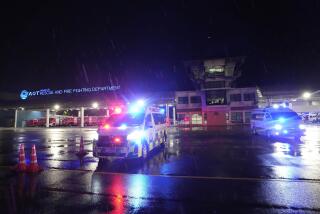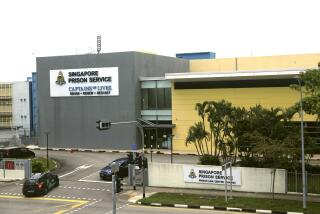Singapore Sees Efficiency as Key to Its Success
- Share via
SINGAPORE — If you want to find out what Singapore is all about and why it’s not rattled by the Asian economic crisis, you might start at the old colonial convent on North Bridge Street that houses the Mass Rapid Transit offices.
Inside the dim, ultramodern control room, half a dozen men sit at computers, loading in timetables and commands. A few feet away, a huge digital board tracks 80 rush-hour trains that are speeding under and over Singapore, each relentlessly on schedule. Cameras relay pictures from the spotlessly clean, crime-free stations along the 52 miles of track. If a carriage is marred by graffiti--”a very, very rare occurrence,” said an official--it is taken out of service.
While traffic-clogged cities such as Bangkok and Manila are only now building rapid-rail systems, Singapore opened its rail line 10 years ago. Both profitable and efficient, it carries nearly 1 million passengers a day, or one in three Singaporeans. And like much else that this tiny city-state has set out to build--from its airport to the uncongested roads that wind through lush, landscaped parks--it is the very best in Asia.
“When you’re small like Singapore, you can’t afford to be second best,” said Kewk Siew Jin, the transit authority’s managing director. “You have to plan strategically, have to be efficient, to stay ahead of the curve.”
Amid the economic gloom engulfing Southeast Asia, Singapore plows ahead, full bore, producing the “commodity” on which its survival rests--efficiency. Its obsession with being best, with providing the climate and infrastructure that make business work, has turned it in four decades from a dilapidated backwater into Asia’s most orderly, regulated and user-friendly city.
For newly arrived foreigners, Singapore is Asia 101, offering a lifestyle not very different from the ones many left behind. English is spoken everywhere. “Titanic” is drawing crowds at the multiscreen cinemas. Borders has opened a new super-bookstore with 120,000 titles. You can drink Starbucks coffee, eat Tony Roma ribs, watch CNN and while away an evening at the Long Bar in the Raffles Hotel, where bartender Ngian Tong Boon invented the Singapore Sling in 1915. On top of that, there is not a street in Singapore that is unsafe, even at the darkest hour of night.
If you’re one of the 16,000 Americans who live in Singapore, representing 1,500 U.S. companies, you can join the U.S. Chamber of Commerce, sip a martini and work out at the American Club, send your children to the American School--its spacious campus includes three baseball diamonds, two swimming pools and a football field--and live in a condo off Orchard Road that would not be out of place in Beverly Hills (average price for three bedrooms: about $6,000 a month).
“But what really brings people here is efficiency. Everything works,” said Chris Fussner, a U.S. electronics distributor. “I can have a machine arrive at the airport at 8 a.m. It goes straight through customs and, in three hours, it’s in my demo area or my customer’s factory.”
*
Singapore--a dot at the tip of the Malay Peninsula, not much bigger than Utah’s Zion National Park--is hardly immune to regional pressures: Its currency has lost about 15% of its value in the recent economic troubles and its stock market 35%. But the Singaporeans’ passion for excellence and strategic planning has positioned the former British colony well not only to survive but, perhaps, even to benefit from the Asian economic crisis.
While its neighbors in Thailand and Indonesia were spending wildly as if good times would last forever, Singapore was building up its foreign exchange reserves (now $75 billion) to ride out any downturns. While Malaysia was building the world’s tallest building and Indonesia was putting up glass-fronted high-rises, Singapore skipped the self-indulgent projects and concentrated on basic systems that make things work: ports, airports, roads, communications, public housing, public safety, health care.
And while others were blaming Asian woes on everything from a Jewish conspiracy to currency manipulators, and complaining about American inaction, Singapore’s former prime minister, Lee Kuan Yew, said the fault lay squarely with Asian governments. Their policies, he said, often showed “stupidity and weakness.”
Singapore also acted early to stem soaring property prices, ordering banks last year to cut back on real estate loans, reducing the amount of land available for development and putting a 100% capital-gains tax on property sold within three years of purchase. The moves caused a real estate slump in Singapore, but, unlike in other Asian cities, there is no crash scenario in sight here.
Another cushion: Corruption is negligible, and Singapore’s banks simply don’t engage in the “crony capitalism”--lending money to influential friends and politicians--that got Thailand and Indonesia into trouble.
All of which puts Singapore, Southeast Asia’s leading business center, in an enviable position. A year ago, it was worried about Malaysia’s emergence as a competitor. But the free-spending government in Kuala Lumpur has been hit hard by the current crisis.
At Changi International Airport--voted the world’s best 10 years in a row in surveys of business travelers--Sim Kee Boon, chairman of the Civil Aviation Authority, settled back in his spacious office and said the miracle of Singapore happened by plan, not circumstance, as part of Lee Kuan Yew’s vision of the future.
“You’ve got to remember,” he said, “that after we got self-government [in 1959], we had severe unemployment. Education was bad. Singapore was undeveloped. Our government--which then had a very socialistic complexion--made the conscious decision to modernize and industrialize, to use English and promote a free-market economy, to invite in multinational corporations and offer essential services like a superior airport.”
Today, 60 airlines fly to 100 countries on five continents from Changi. On the desks of immigration officers, jars of mints greet arriving passengers. Those with carry-on luggage are usually out of the terminal within 10 minutes of arrival. Freight forwarders have voted Changi the world’s most efficient cargo handler, and the Changi-based carrier, Singapore Airlines, is at or near the top of every poll of business travelers’ favorite carriers.
“We’ve had to accomplish in 30 years what has taken other nations half a century to do,” said Edwin Thumboo, a professor of English at the University of Singapore. “That’s the consequence of being small, of having no hinterland. You see those islands out the window? They’re Indonesia. So our limited space has forced us to make the most of what we’ve got.”
To keep traffic flowing smoothly--and Singapore is the only major Asian city where traffic jams are unknown--cars are heavily taxed, and prospective buyers can obtain an owner’s license only through a lottery. Permits to drive in the inner business district on weekdays cost $60 a month. Buses are equipped with cameras that take a picture of any vehicle ahead using a bus lane, an offense that results in a heavy fine.
Some trucks and vans are equipped with beepers that go off when they exceed the speed limit. A flashing light on the roof is automatically activated, making the driver easy prey for police cruisers. And “road pricing”--which in effect turns thoroughfares into toll roads at certain times, with fees collected through the use of dashboard meters--deters traffic from entering the city during rush hours. Singapore invented the system that is now being used in 20 countries.
Singapore also ranks as what may be the world’s cleanest city. Litterers are fined on the spot; graffiti vandals, such as American teenager Michael Fay, have been caned; anti-smoking regulations are the toughest in Asia; and the sale of chewing gum is banned (it’s messy and expensive to clean up).
*
Perfection, however, has its price, and Singapore has plenty of critics. They think it is a prissy, antiseptic place, so full of rules and regulations, so controlled by governmental edict, that the human spirit loses its sparkle while creativity and spontaneity are drained from the bloodstream of life.
Even Lee Kuan Yew has been saying recently that Singapore needs some “buzz” if it is to be recognized as a truly energized, world-class city. Hong Kong has buzz. Bangkok has buzz. Singapore has a soft hum of efficient people doing efficient things in an efficient atmosphere.
“When you sit here in a sidewalk cafe like this and see all this modern stuff around and you have a government that’s setting the agenda for culture, everything tends to feel a little artificial,” said Simon Tay, a Harvard-educated writer and lawyer and a member of parliament. “I think that’s why the sterile label stuck on Singapore.
“But the old had to give way to the new for there to be a Singapore. What Singapore is about is being Asian and being modern.”
For Singaporeans, there is a trade-off for staying at the head of the pack: a little less democracy in return for prosperity and security.
Singapore’s media exercise caution, and the People’s Action Party has been in power since independence and holds all but two of the 83 seats in parliament. The Internal Security Act, permitting detention at the discretion of the executive, has been in effect for 33 years, though it is seldom used.
“I know Westerners don’t understand the curtailment of any individual liberties,” said Sim, the civil aviation chairman. “But what we have to ask ourselves is, do we have a better life than friends in, say, India, who are supposed to have more democracy? And I think, for us, the answer is pretty obvious.”
More to Read
Sign up for The Wild
We’ll help you find the best places to hike, bike and run, as well as the perfect silent spots for meditation and yoga.
You may occasionally receive promotional content from the Los Angeles Times.






